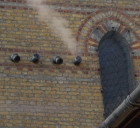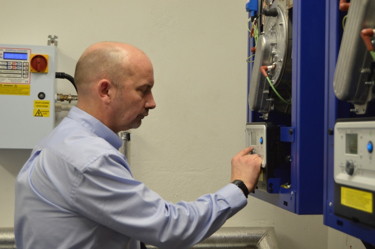The day-to-day realities of commissioning

Dave Ward of Hamworthy Heating, explains what a commissioning job entails and why it’s worth considering — not just in terms of efficiency, but also customer safety.
Servicing and commissioning commercial heating systems means that every day can offer a challenge which needs to be solved, especially due to the scope of commercial projects. Hands-on in-depth product knowledge and even extended warranty terms (manufacturer-dependent) can be two of the advantages of using a manufacturer’s service engineer for commissioning. The former is also the reason why some project specifications ask for the commissioning to be carried out by the manufacturer. But what are the benefits of commissioning itself and what does it involve?
It’s not just about the boiler, it’s about the whole system
A variety of elements come into play for a heating system to run the way it’s supposed to — gas pipes/supply, pumps, ventilation, flueing, the boiler etc. During a commissioning job, we’re not only looking at boilers and water heaters but rather the system as a whole to see if it is actually possible and safe for the boiler to be fired. I was once on a job at a very well known site in London and was shocked was shocked to discover there were no safety valves on the boilers, which could easily lead to an explosion causing harm to occupants of the building.
Would you feel confident to drive a new car that hasn’t been tested?
Before firing the boiler, I carry out pre-commissioning checks, such as if there’s water in it — firing a dry boiler can be quite dangerous — and if the chimney is connected.
Following a commissioning procedure, I document everything assessed and measured in the plant room. For the boiler system, it’s about making sure the pipe connections are installed as per the instruction manual, checking safety mechanisms are fitted (such as safety valves) and the system pressure is in a normal range. Next, the flue system is checked (sizing, no spillage) and, of course ,the gas. It’s vital the gas supply is sufficient and not undersized to ensure the boiler can run on it.
To test the safety functions are working, I stop the gas supply which should produce a fault code telling me there is no gas supply.
Once the boiler is fired, I check the flue-gas to see if it’s firing correctly. Incomplete combustion would mean it isn’t and lead to the formation of dangerous carbon monoxide. But that’s just one of several checks I carry out.
There are of course legal requirements for gas work, probably the most important being ‘The gas safety (installation and use) regulations 1998’.

As a gas engineer, I must be on the Gas Safe Register (the official gas registration body in the UK) to be legally allowed to carry out gas work. I retrain every five years, get retested and keep up to date with changes in gas safety.
On a practical level once I’m on site, ventilation and flueing are crucial aspects in a plant room, with standards I have to adhere to. Failure to consider them can be harmful for life.
By years of experience, you get an initial feel for correct sizing just by sight. Once I enter a plant room, I take a good look around to get an idea of the ventilation. A few grilles might not look sufficient but can be in some cases. That’s why everything is assessed and measured in accordance with guidelines.
I’m also making sure the gas supply is sufficient. Despite calculations when the boilers are fitted, it might not be big enough, especially where an older system has been inherited but not updated to accommodate new boilers or water heaters.
Sometimes, however, I visit a site and there are many issues that need to be rectified before the boiler can be fired. In these cases, I will write up a sheet with advisory notes for the customer to resolve the problems before I can carry on with the commissioning job. On a servicing job at a premium supermarket chain I once encountered a boiler with 25 fault messages caused by the store manager pushing the reset button. In those cases, it really is a matter of educating the customer.
Commissioning is not just about setting up a correctly-sized and efficient heating system, but ensures first and foremost a safe installation. Gas applications are a safety risk if not installed or checked properly. If a manufacturer’s engineer is looking at it, you can be assured he has the required in-depth knowledge of the product to set things right. It’s one way to give peace of mind, and also to ensure the long-term reliability of a heating system.
Dave Ward has been service engineer at Hamworthy Heating since 1998.







